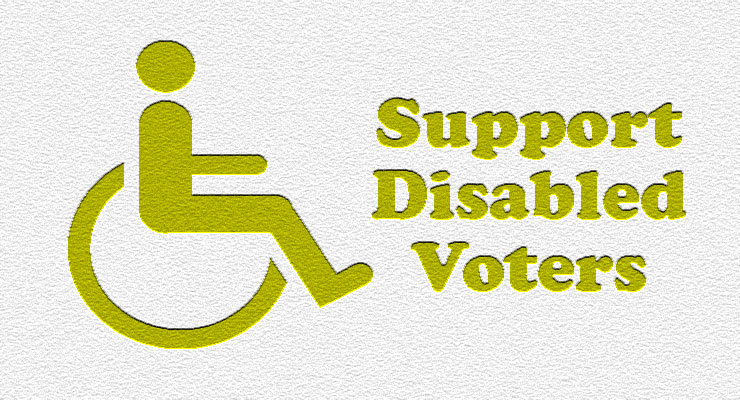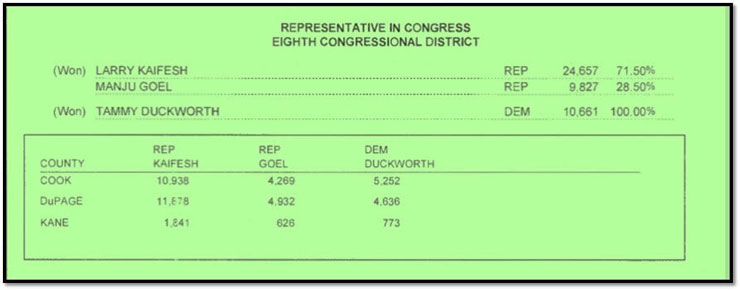
I am a new writer for Democracy Chronicles and I am disabled. I have broken bones in both legs and my hip from a reckless driver running into me head-on at 60 mph. I was on my way to work at the Indiana Supreme Court, where I provided statistical and other services to the Chief Justice of Indiana and over 400 trial and appellate courts. My mental disabilities also come from public service because I was poisoned at birth on Camp LeJeune, the worst water poisoning disaster in United States history, where over 1 million U.S. Marines and their families were poisoned.
The only thing that makes me feel better after a lifetime of suffering from these disabilities is to push hard for disability rights. The Illinois Court of Appeals has called me, “a public figure who works on disability issues.” (p. 2). Similarly, the ABA Commission on Disability Rights made me its spotlight attorney with disabilities, calling me a, “Political advocate for people with disabilities.” I started a political party for people with disabilities, Disability Party, because political action is the only way to obtain lasting positive changes for disability rights.
Despite my legal background, I have found courts at both the state and federal level in the Midwest to be absolutely hostile to disability rights and people like me who are both lawyers and disabled. It is worth reading about the corruption used to prevent me in particular from demanding disability rights. Straw v. United States, 18-5247 (D.C. Cir.). When the courts are hostile, it is time to go back to Congress or state legislatures and make the laws so clear that even a corrupt judge cannot deny it. The ADA is denied on a regular basis and this is a sin.
In law school, I was the research assistant for the dean, Professor Alfred C. Aman, Jr. Over time, he has come to believe that we have something he calls a “Democracy Deficit” and after my experience with the courts, I agree with him. Courts consist of a tiny minority of people who can act as a conspiracy to deny any right, including constitutional rights. Hon. Richard Posner, a senior judge on the 7th Circuit, said to the New York Times that he ignores the law:
He called his approach to judging pragmatic. His critics called it lawless. “I pay very little attention to legal rules, statutes, constitutional provisions,” Judge Posner said. “A case is just a dispute. The first thing you do is ask yourself — forget about the law — what is a sensible resolution of this dispute?”
The next thing, he said, was to see if a recent Supreme Court precedent or some other legal obstacle stood in the way of ruling in favor of that sensible resolution. “And the answer is that’s actually rarely the case,” he said. “When you have a Supreme Court case or something similar, they’re often extremely easy to get around.”
If a judge is simply enacting his or her own prejudices and biases and the laws make no difference, people with disabilities, who have been left out in the cold so many times, get no warmth from the Rehabilitation Act of 1973 or the Americans with Disabilities Act of 1990. The Constitution provides only one means to remove judges who violate their oaths to uphold the law. This means is impeachment and the U.S. House is the only body that can impeach a federal judge, while the U.S. Senate holds the trial to remove the judge.
Judges are to serve only on good behavior and this weak standard appears in Article III of the U.S. Constitution. So, if a judge like Posner or others who attack the disabled population and disabled lawyers needs to be removed, this is the means.
The need to take action
This makes having a pro-disability rights Congress a critical factor in whether judges can call ADA cases frivolous with impunity, which they frequently do. And that word frivolous can be used by a state court to rip away disability rights and the right to practice law from a disabled lawyer. I know because it happened to me and the Virginia State Bar called what happened to me, “a drive-by shooting.”
It is ironic that the Court in Indiana is the same court where I broke my legs and pelvis driving there to work. There is no respect for sacrifice, only a vindictive fear that someone might label that discriminating Court as an ADA violator, and I did that many times.
Courts don’t like being labeled according to their actions. They like to discriminate in the dark, like most civil rights violators prefer to do. There is still a precedent that called an NAACP case frivolous when that group merely wanted discrimination in housing to stop. It is sickening that the U.S. Supreme Court still has precedents that allow sterilization of disabled people: Buck v. Bell, 274 U.S. 200 (1927); Stump v. Sparkman, 435 U.S. 349 (1978). This needs to be undone.
And of course, the state that attacked me, Indiana, was the first place on the planet to pass a Eugenics Law, inspiring the Nazis to pass a similar law in 1933 and this resulted later in the Murder of the Disabled. The first victims of the Holocaust were disabled children, allowed to starve to death or killed in gas chambers, the first ones to experience this.
My runs for Congress
So, I ran for Congress three times, hoping to make a difference and have the power to draw up and present impeachment papers. I ran as a Democrat, as a Green in the same election (2012), as a liberal Republican (2016), and finally under my own party banner, Disability Party (2018). All these attempts included being booted from the ballot for not having enough signatures even when my disabilities make it nigh impossible to gather so many signatures myself without very serious pain from my broken bones.
In 2016 and 2018, I asked the Illinois State Board of Elections to give me ADA Title II accommodations because I am disabled and there are reasonable things the ISBE could do to help me gather those signatures. First, the U.S. Constitution, Article I, does not require candidates for Congress to gather signatures. The States have added this requirement and corrupt federal judges have allowed the States to do this. Here we have the same problem again. The Constitution provides a list, a very specific list of qualifications and the States try to prevent people otherwise qualified from getting on the ballot by adding signature requirements.
To give you an idea of how heavy these requirements are for a new party, when I tried to run under Disability Party in the 8th District of Illinois in 2018, the signatures requirement was over 13,000 signatures. When you look back at past primary elections, winners of the Democratic primary have received less in votes than this. This serves to demonstrate how unfair this system is because then-U.S. Representative Duckworth only had to collect a few hundred signatures to get on the primary ballot and NO signatures to get on the General Election ballot.

So a brand-new party has to get more in signatures than the major parties have to get in votes. It is outrageous and a symptom of the unfair system piled on top of the Constitution by the State of Illinois. And the ISBE has told me in two elections that they are not willing to allow any accommodation I asked. I asked for things like getting permission to sign for a voter over the phone using the phone numbers in the official voter rolls. I asked to be able to gather signatures online, like using Facebook or a webpage. And I justified these accommodations using the ADA and its Title II regulations, which is higher law than the Illinois Election Code and the regulations of the ISBE.
Take to the courts!
Like any good lawyer faced with a state agency clearly violating federal law, I sued. Straw v. ISBE, 3:18-cv-3066-SEM (C.D. Ill.) The Illinois Attorney General argued that the ADA does not cover states even when the ADA itself says it does. 42 U.S.C. § 12202 and the Title II regulations do not support what ISBE said at all:
35.178 State immunity.
A State shall not be immune under the eleventh amendment to the Constitution of the United States from an action in Federal or State court of competent jurisdiction for a violation of this Act. In any action against a State for a violation of the requirements of this Act, remedies (including remedies both at law and in equity) are available for such a violation to the same extent as such remedies are available for such a violation in an action against any public or private entity other than a State.
I felt that I had more than enough evidence to support a summary judgment and so I filed a motion for summary judgment. The ISBE by its counsel failed to respond to my motion within the time allowed. The Clerk of Court even placed the deadline in the docket of the case so everyone could see it using www.pacer.gov (database of federal court cases and filings, including real time dockets).
The counsel for the ISBE responded by calling my motion “frivolous,” and it is ironic that it is precisely this type of abusive language that motivated me to run for Congress in the first place. I told the Court and warned the ISBE lawyer that I would seek Rule 11 sanctions for abuse of that word.
So, I am waiting. If I successfully achieve ADA Title II accommodations from my case, this will mean a federal court precedent that will benefit disabled candidates in all 50 states. If a person with disabilities can use a polling company to gather signatures instead of having to go on the street or door to door, the prospect of 13,000+ signatures seems much less daunting. It would seem less daunting for presidential candidates needing to gather hundreds of thousands of signatures.
And if the composition of Congress shifts to people who have disabilities, it will mean that judges who violate disability rights and refuse to enforce disability laws can expect punishment, including impeachment and removal. The current Congress does not care enough to make the judges behave. I am doing my part to make sure that judges behave in the future. That requires many people disabled people to run for office and demand their rights.
Leave a Reply